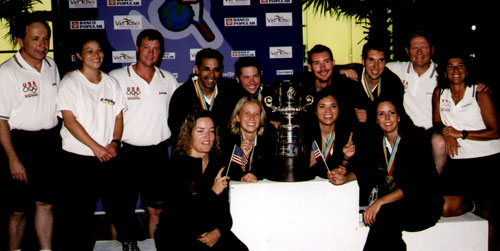
September - October 2002
Vol. 13, No. 5 | Contents
from Staff Reports
Daily Reports
Final Results
Coaches Diary
Racquetball
Canada

|
PHOTO
GALLERY Above L-R (back row): Dave Ellis, Jennifer Louie, Drew Kachtic, Ruben Gonzalez, Mike Guidry, Jason Thoerner, Jack Huczek, Jim Winterton, Fran Davis. Front: Cheryl Gudinas, Kim Russell, Jackie Rice, Laura Fenton. [Coaching staff are wearing white shirts, team members are in black] Photo: James Perez. Photos by James Perez Photos by Eric Meyer Photos by Usher Barnoff Photo by Mike Mesecke Photos by Yasushi Tanahara Photos featured here do not appear in the print edition ... |
| Men's
Individual Titles ... Even though he was playing in Canada’s second roster position in singles, going into the tournament Kane Waselenchuk was the player to beat. He finished the IRT season ranked No.4 and just won the Tournament of Americas in Bolivia – the last major international event. Right behind Waselenchuk, figuratively and literally, was Jack Huczek, who finished his rookie season on the IRT at No.5. But Huczek hadn’t given the showing everyone had expected from him in Bolivia, losing to Javier Moreno in the semifinals, and he’d lost to Waselenchuk in each of their three previous meetings. Huczek began his week as a close second to Kane to win it all. Elsewhere in the field, there were several other players with a shot at winning the title, including defending champion Alvaro Beltran of Mexico. He’d had a roller coaster pro season but was playing well, and reached the semifinals at pro-nationals before finishing the season No. 6. Countryman Javier Moreno was also on the top of his game; he had surprised Huczek with a semi-final loss at the Tournament of the Americas, and then barely lost to Waselenchuk in an 11-8 tiebreaker. And darkhorse prospects Brian Istace of Canada and Jason Thoerner of the U.S., were sure to figure into the mix. Their experience level, however, was as different as night and day. Istace was making his third world championships appearance in a row, and had earned a semifinal berth in 2000. Thoerner had finally won a rookie appointment to the U.S. National Team in May and was making his international debut ... ... Doubles Polo Gutierrez is 18 years old; his partner Gilberto Mejia is 20. They live so far apart that they never play doubles together in anything less than a national event. At the Mexican nationals last spring, Gil defeated Polo for the singles title, and they paired up again in doubles, losing to Alvaro Beltran and Javier Moreno. The roster was flipped by the coaching staff going into Worlds, based on the uncanny ability of the two young athletes to come together, on short notice, and play exceptionally well. “We have trust between us,” said Polo “and we thought that, if we could beat the U.S., we could win it all.” That is what they came to do, and based on seedings determined by team finishes at the last World Championship, that opportunity came earlier than their U.S. counterparts – with an average age of 42 – would have liked. |
Women's
Individual Titles ... Not surprisingly, defending champion Cheryl Gudinas was the clear favorite in the women’s individual competition. The most dominant women’s racquetball player since Michelle Gould (with three world titles), Gudinas was going for number two in Puerto Rico, after coming off her second straight LPRA season at the top of the rankings, and ending with a five-stop winning streak. Much improved since becoming the Canadian national singles champion last May, Jennifer Saunders was hoping to make a mark of a different sort at the world championships. Two years earlier, she’d been at the 2000 Worlds in San Luis Potosi – but as a team official, not a player. This go round, she was highly-motivated to perform and justify her top roster spot. Also stepping up her game was long-time U.S. team member Laura Fenton, who won the Tournament of the Americas singles title and finished second to Gudinas at national singles. After battling injuries for the past few years, she appeared healthy and back in top form ... ... Doubles The women’s doubles team looked like a sure bet for the title before the tournament even started. Jackie Rice, one of the best left-side doubles players ever, was teamed up with Kim Russell, one of the best right-side doubles players ever. Rice had won three previous doubles world titles and Russell earned one of her own in 2000, and had a title defense to launch. They rolled into the finals against Canada’s Amanda MacDonald and Karina Odegard, having only conceded 10 total points in three rounds of play. The Canadians turned out to be the toughest match in the tournament for the U.S. pair, but they handled the pressure with ease. After earning a 15-10 victory in the first game they only got better and downed the Canadians 15-8 in the second for the world title. Even though it was the first time that Rice and Russell played doubles together, they felt that they meshed so well they are planning to continue as a team at the U.S. National Doubles Championships in October. |
Top | RacquetballMagazine.com | USRA.org
© United States Racquetball Association -- All Rights Reserved